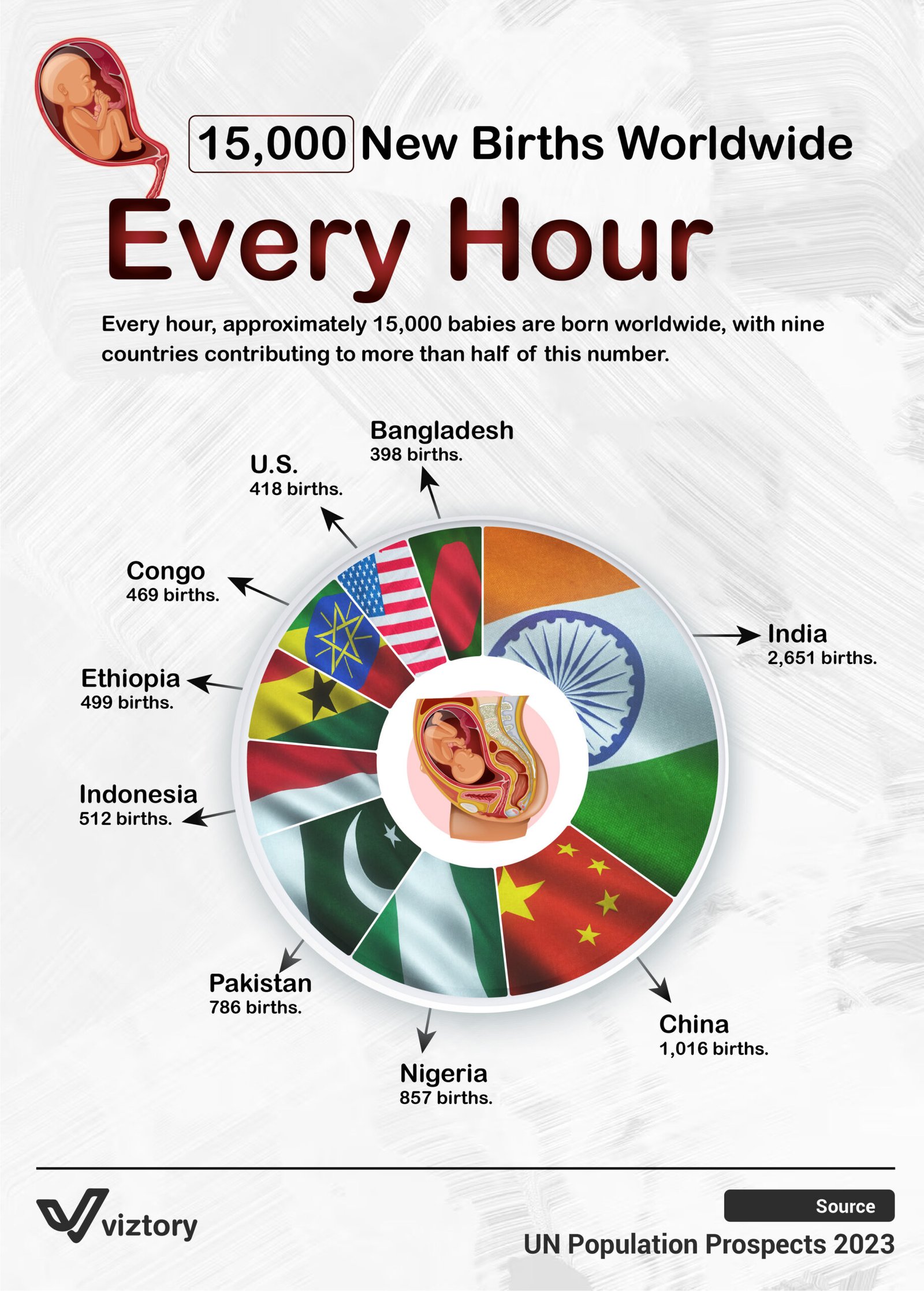15,000 New Births Worldwide Every Hour
-
Jan, Sat, 2025
Every hour, approximately 15,000 babies are born around the world, with just nine countries contributing to over half of this total. This remarkable statistic not only reflects global population growth but also highlights the critical role healthcare systems play in supporting maternal and newborn health across diverse regions.
Global Birth Statistics
- India (2,651 births/hour): Leading the world in hourly births, India’s healthcare system faces significant challenges in providing equitable maternal and neonatal care, particularly in rural areas. Initiatives like Ayushman Bharat aim to improve access to quality healthcare.
- China (1,016 births/hour): As the world’s second-largest contributor to new births, China emphasizes maternal health through its robust hospital infrastructure and growing investment in prenatal care technologies.
- Nigeria (857 births/hour): Nigeria’s high birth rate underscores the urgent need for enhanced healthcare access, as the country still grapples with high maternal and infant mortality rates. Efforts like expanding rural healthcare facilities are crucial.
- Pakistan (786 births/hour): With one of the highest fertility rates in South Asia, Pakistan continues to strengthen healthcare delivery through public-private partnerships and community-based programs.
- Indonesia (512 births/hour): Indonesia’s healthcare strategy focuses on integrating traditional practices with modern medical care, especially for underserved communities in its vast archipelago.
- Ethiopia (499 births/hour): Ethiopia has made strides in improving maternal healthcare through initiatives such as the Health Extension Program, though challenges remain in reaching remote areas.
- Congo (469 births/hour): The Democratic Republic of Congo faces significant hurdles in maternal and child healthcare due to ongoing political and economic instability. International aid plays a vital role in bridging the gap.
- U.S. (418 births/hour): The United States, despite advanced healthcare systems, struggles with disparities in maternal health outcomes, particularly among minority populations.
- Bangladesh (398 births/hour): Bangladesh has made significant progress in reducing infant mortality through community health workers and expanded access to prenatal care.
The Role of Technology in Maternal Healthcare
The intersection of healthcare and technology is reshaping maternal and newborn care worldwide. Innovations such as telemedicine, AI-driven diagnostic tools, and mobile health applications are helping bridge gaps in healthcare access. In countries with high birth rates, these technologies can play a transformative role in ensuring timely care, early detection of complications, and efficient resource allocation.
Global Challenges and Opportunities
- Access to Quality Care: Many countries with high birth rates face challenges in providing consistent and quality healthcare, particularly in rural and underserved areas.
- Maternal and Infant Mortality: Despite progress, high mortality rates persist in regions like Sub-Saharan Africa, highlighting the need for targeted interventions and global collaboration.
- Sustainable Healthcare Systems: The rapid population growth places immense pressure on healthcare systems, necessitating investments in infrastructure, workforce training, and community health programs.
A Path Forward
Healthcare professionals, policymakers, and technology innovators must work together to address these challenges. Strengthening maternal and child healthcare systems will not only save lives but also contribute to sustainable development goals by fostering healthier, more equitable societies.
This snapshot of global births underscores the importance of advancing healthcare systems to meet the growing needs of a rapidly expanding world population.

